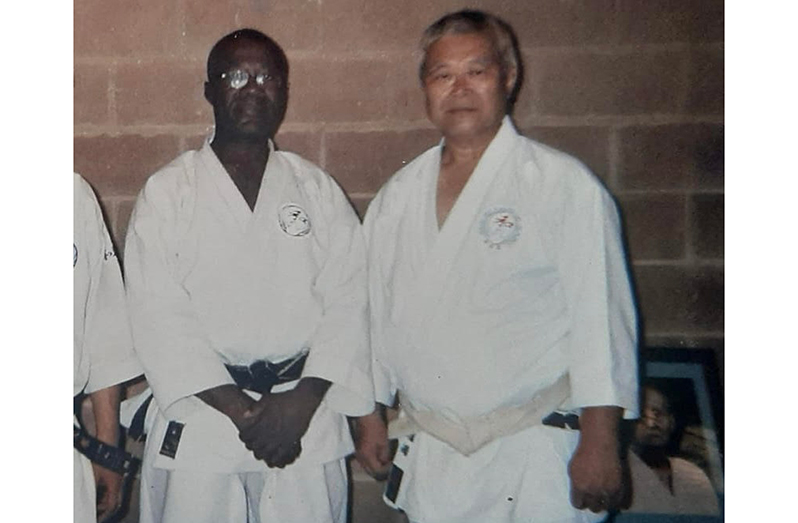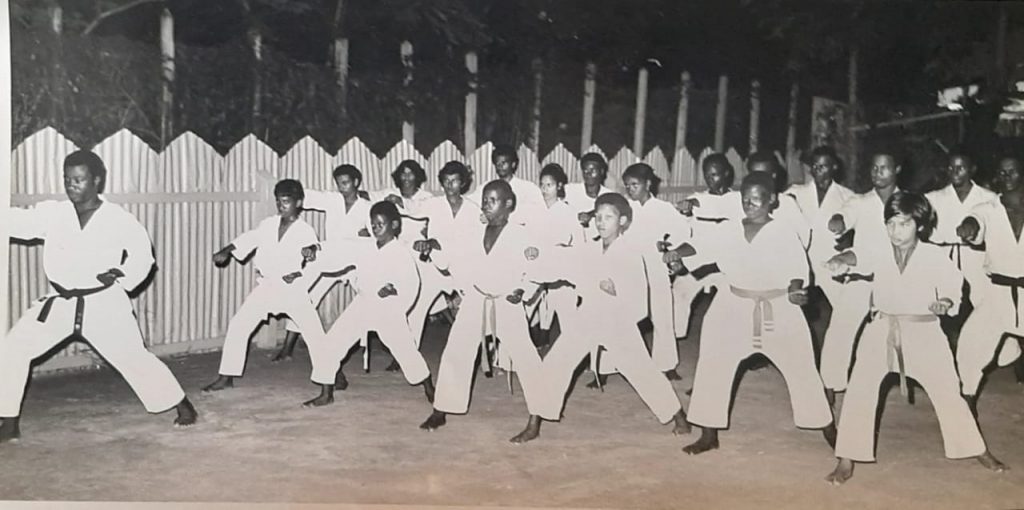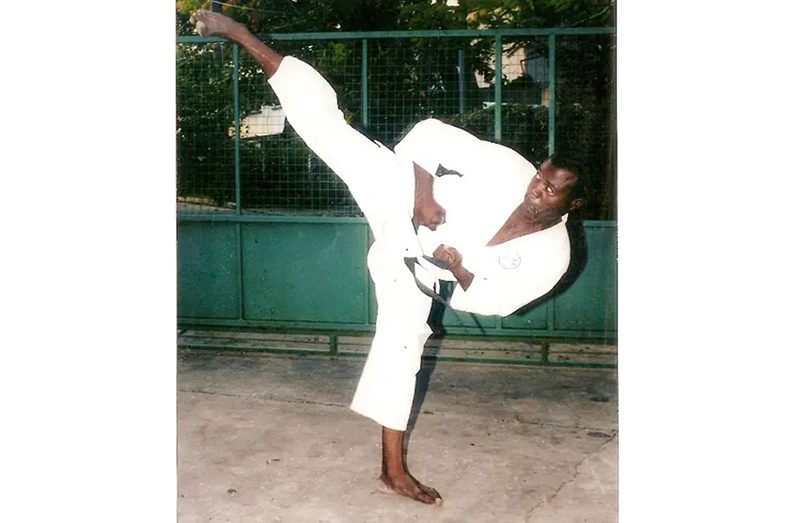FROM a little New Amsterdam boy to a well-renowned Martial Arts instructor, Sensei Compton Winston Dunbar has managed to transform the martial arts discipline in Guyana.
At the tender age of six, Sensei Dunbar and his mother, the late Stella Thomas left their home in New Amsterdam, Berbice, and relocated to Providence, East Bank Demerara.
Despite such a sudden relocation, he explained that he felt right at home and quickly adapted to the new surroundings.
Sensei Dunbar told the “Pepperpot” in an interview that he was first introduced to martial arts when he joined a community centre in his area.
Tackling all sports from cricket to weightlifting, he stated that nothing captured his attention like martial arts, and the hobby slowly manifested into a passion, which he has been pursuing for 57 years.
Under the guidance of Brown Belt Dennis Forde-Singh, a Shotokan karateka, the 76-year-old Dunbar of Wado-Ryu Karate started practising karate in 1967 at Lithographics Karate Club.
Wado Ryu is the karate style that Dunbar practises and teaches.
Wado Ryu is one of the four major karate styles and was founded by Hironori ?tsuka. The style itself emphasizes joint locks, throws, and tai sabaki in addition to striking. Its roots are in Tomarite karate, but it has also absorbed elements of Shito-Ryu, Shotokan, and Jujutsu.

Dunbar stated that when he first got into Wado Ryu, the karate style was not as popular as it is today.
Sensei Alex Waithe, a First Dan Wado in Ryu Karate, and the then-Green Belt karateka met to start the new Wado Ryu Karate Club.
Dunbar was introduced to the Wado Ryu Technique by Sensei Waithe, a graduate of Professor Tatsuo Suzuki Wado Ryu Karate School in London, England, which is widely regarded as the best offensive style in martial arts.
He established his workshops at the Providence Community Centre in 1970 because he was passionate about seeing the discipline advance at the time.
Sensei Dunbar expressed immense appreciation for his inspiration and role model, the late Sensei Tatsuo Suzuki.
His admiration for him sprouted out of how Sensei Suzuki mastered the craft. According to Dunbar, looks were deceiving when it came to the late Professor Suzuki. Even though Suzuki was of “small stature,” he was an excellent professor and fighter, said Sensei Dunbar.
Discipline is key
Dunbar stated that from day one, his mother supported his dreams.
“My mother doesn’t make a joke. She used to make my cow heel soup and fish broth,” he said, as he relished how nurturing his mother was.
Despite the stigma behind martial arts, it is not solely about fighting. Sensei Dunbar debunked these misconceptions and highlighted the meaningfulness of the art.
“Martial arts is much more than fighting. It goes beyond that,” he said.
Highlighting the many ways in which martial arts can better a person, the karate apostle stated that it teaches one discipline and gives self-confidence.
Dunbar participated in the team-fighting competition at the 1975 World Karate Championships in Los Angeles, California, where Guyana lost to Canada. Charles Woon-a-Tai, Maureen Da Costa Woon-a-Tai, Keith Da Costa, Leslie Brummell, Steven Embrack, and Frank Woon-a-Tai served as the team’s fighters and coaches. Dunbar served as the team’s captain.

Although the Guyanese team lost, Sensei Dunbar did not let this trample on his dreams and aspirations.
He stated that the competition was an eye-opener. “When I came back, I started looking at the other fighters, especially the Japanese team. I came back and gave my students the same teachings and six months later, we came out successful,” he said.
The success of his teachings and accomplishments still prevails almost forty-eight years later.
Sensei Dunbar has become a favourite in the martial arts world in Guyana, more so, last week Sunday. His students hosted a surprise birthday bash to celebrate the karate disciple.
Dunbar has trained people like Eze Wickham, Ken Danns, Adrian Chesney, Angus Jeffrey, Dianne Ferreira-James, Darren Nurse, and Carwyn Holland, among others.
He further expressed to this publication, gratitude to Banks DIH Limited for supporting his work throughout the years.
There is an established dojo at Thirst Park. However, due to the COVID-19 pandemic, it was forced to close its doors. Nevertheless, according to Sensei Dunbar, practice is slated to recommence since the country has returned to some sort of normalcy.



.jpg)









